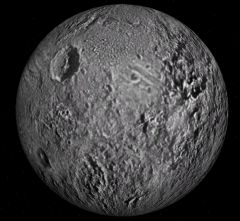Autonoe
Jump to navigation
Jump to search
Autonoe (Jupiter XXVIII, S/2001 J 1) is a retrograde satellite of Jupiter. It was discovered by Scott Sheppard et al at the Mauna Kea Observatories in Hawaii in December 2001. It is named for Autonoë, daughter of Cadmus in Greek mythology.
Autonoe in Orbiter
Autonoe was first introduced into Orbiter with the add-on jupiter_v.zip in August 2003. Note that Autonoe is provided by the add-on as S/2001-J 1. To simulate it as Autonoe, the following changes need to be made.
- File:S2001_J1.cfg:
- change the filename to Autonoe.cfg
- change the name in the comment line in the top line to Autonoe (S/2001-J1, Jupiter)
- line 3, change NAME = to Autonoe
- Last line, change the name of Base1 = to Autonoe
- File:S2000J1-Station.cfg
- change the filename to Autonoe-station.cfg
- Line 3, change the name to Autonoe-Station
- File:Jupiter_S2001J1.scn
- change the filename to Jupiter-Autonoe.scn
- Line 2, change S2000J1 Station to Autonoe Station
- Find the GL-01 ship, change STATUS Landed S2001-J1 to Landed Autonoe
- Change BASE S2001J1-Station:1 to Autonoe-Station:1
- File:S2001-J1.tex, change filename to Autonoe.tex
- File:S2001-J1M.BMP, change filename to AutonoeM.BMP
| Add-on | Source | Version | Author | Type | Release Date | Compatibility | Wiki article |
|---|---|---|---|---|---|---|---|
| The Outer Planets 060929 Base | AVSIM | Rolf Keibel Carl Romanik Tony Dunn |
Scenery | 30 September 2006 | Orbiter 2006-P1 | ||
| The Outer Planets 050125 | AVSIM | 050125 | Rolf Keibel Tony Dunn |
Scenery | 26 January 2005 | Orbiter 2005-P1 | |
| Jupiter V | AVSIM | Rolf Keibel | Scenery | 17 August 2003 | |||
See also
Gallery
| edit The Solar System | |
|---|---|
| Central star |
Sun (Sol) |
| Planets |
Mercury - Venus - Earth - Mars - Jupiter - Saturn - Uranus - Neptune |
| Natural satellites |
Moon - Phobos - Deimos - Io - Europa - Ganymede - Titan - more... |
| Add-ons |
Planets - Dwarf Planets - Small objects - Natural satellites - Alternative star systems |
 | This natural satellite related article is a stub. You can help Orbiterwiki by expanding it.
|




